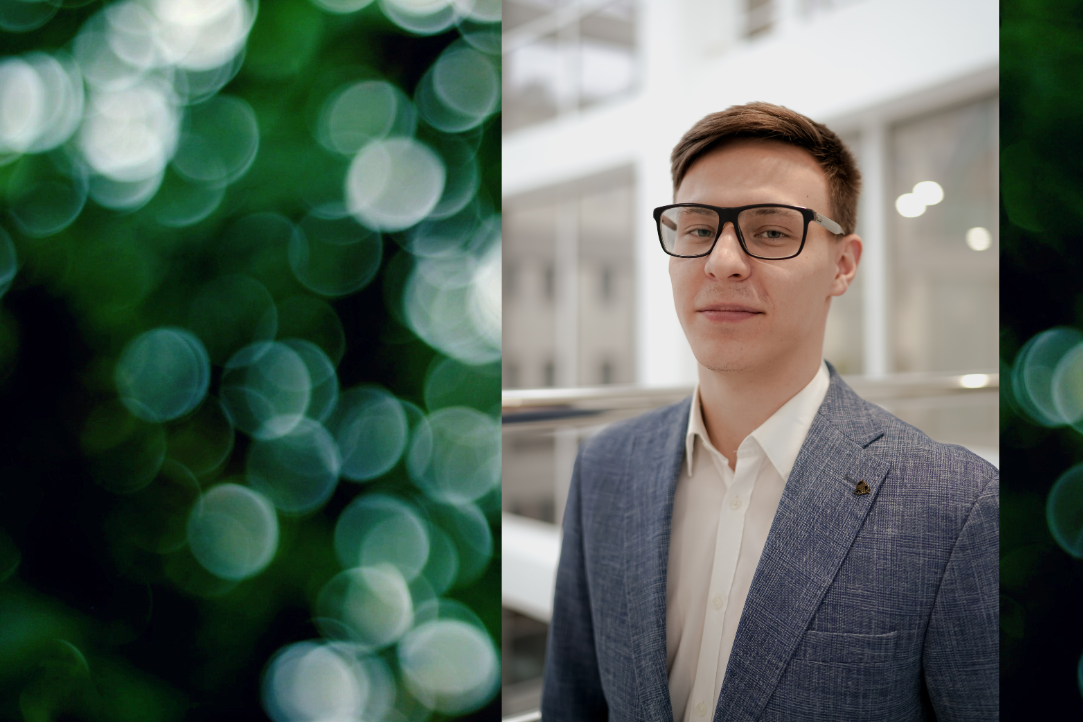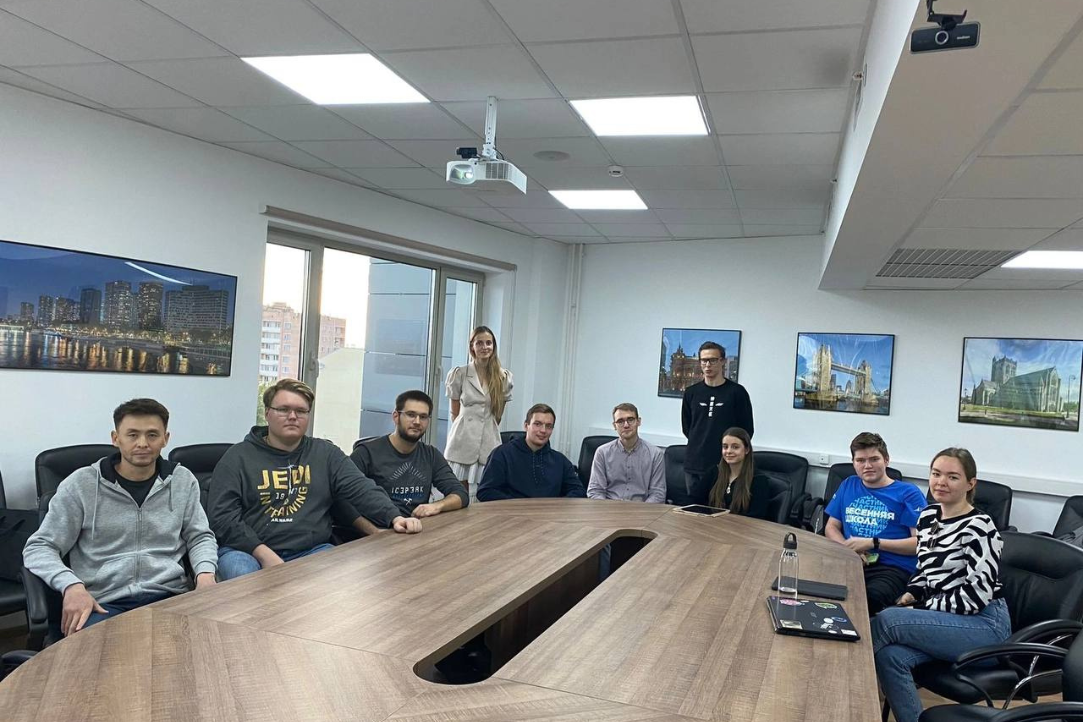“The Higher the Bar, the Higher the Result”: Maxim Shibanov About Studying at ICEF

From political science to economics
It has changed profoundly. I spent the year before ICEF working hard on math and economics. Thought I’d do myself a favour if I prepared properly. But little did I know how demanding my studies would be. Our academic supervisor Maxim Nikitin was right when said this programme is designed for us to give all our attention to it.
Studying takes all my time. I literally have to spend all my free time studying to keep myself at an average level. If I were to make my grade up, I’d have to find even more time and work harder.
The decision came spontaneously. Though, I was going to do my master’s at HSE anyway. I have many friends who studied here. HSE and its learning environment sounded an attractive choice.
A good university is often defined as nothing more than a place where students can get quality knowledge. But HSE goes beyond this definition. It is a place that offers academic integration and involvement in career environment. I fully identify myself with this approach.
My initial plan was to join the HSE campus in Saint Petersburg, but I followed my girlfriend’s plan of moving to Moscow and began to look for programmes here. While choosing between economics and management, I learned about ICEF and its master’s programme, and I thought it was a great opportunity for me.
After completing my bachelor's degree I decided to take some time and explore my options. So, it was in late November that I made up my mind on enrolling in ICEF. I then contacted Olga Nizhevich, who is a coordinator for the master’s programme here, to learn more about it and what career opportunities there are after graduation. I was fully convinced it was really worth the effort.
While preparing for the admission, I met someone who is now one of my best friends here at ICEF and was then in his second year of master’s studies. He helped me with micro- and macroeconomics and he told me what to learn to prepare for the Higher League Olympiad. I didn’t win that contest, as you can imagine, but for me that preparation had been a perfect way to upgrade my knowledge of economics.
Then, in February, I used my opportunity to talk with Programme Academic Supervisor Maxim Nikitin at the Open Day. I remember him say, “Good job, young man, but you’d better brush up on math skills. Start now and I’ll see you in the summer.”
Willpower, if anything.
The past year was busy and stressful. I was jobless. There wasn’t a lot I could do with my political science degree. I started a job as a call center operator, moonlighting as an order picker on weekends in Balashikha. Combining those jobs with preparing for the entrance tests wasn’t easy at all, and it wasn’t until I joined the Moscow government that I was finally able to have more time to prepare.
I did study hard at home, using Khan Academy videos, among other sources. What helped tremendously was also ICEF Summer Bridge. In the end, I scored quite high in entrance tests and passed my interview with good result. That's how I got a state-funded place in this programme.
Quite unexpectedly. I wanted to leave Samara for my dream city, St. Petersburg. But because school was boring and I didn’t score high enough in the National Final School Exam to qualify for a state-funded place, I enrolled in Saint Petersburg State University as a fee-paying student. I loved being a political science student, and I studied so hard that they freed me from the tuition fee in my second year.
While a student I taught social science classes at Intellect Center in St. Petersburg. I really enjoyed working with gifted kids.
Also, I have worked repeatedly at polls – first as an election commission observer and then as a member of a precinct commission for the 2021 State Duma Election. I spent my gap year working in the Moscow government, one more career track pursued by many political science majors. It was a great experience but not so much exciting. Civil service lacks this drive you feel when handling a business.

“I don’t have Sundays off”
Absolutely wonderful. The first teacher we met was Alexander Zasorin, who teaches Advanced Math. It was September 1, our very first class, and it was a 70-minute test designed to show where we were with all the topics of advanced math. We were shocked but got down to solving it anyway. How could we say no?
ICEF has completely lived up to my high expectations. It offers quality courses, solid knowledge and the learning pace that keeps you focused on your studies at all times. I have the impression that the curriculum has a design so immaculate that it even regulates lecturers’s speech pausation. They stop for just the amount of seconds needed for us to grasp the idea before moving to next point.
I clearly had knowledge gaps. Now that I’ve restored them I feel at home with most of the material, but I knew from the beginning that I’d have to study twice as hard as those who come from economics background. By ‘twice as hard’ I mean 12 hours a day, which is too much as it is. Even economics majors spend 12 hours preparing for classes.
ICEF's Master's Programme in Financial Economics is aimed at training students to become versatile finance professionals with profound knowledge of microeconomics, macroeconomics and econometrics, who are competent data managers, users of financial instruments, strategic decision-makers, and have the skills for assessing and managing risks in our changing world. Designed with academic support from the London School of Economics, the programme meets all international standards for quality education. Our graduates get employed by leading multinationals, domestic banks and corporations. Every year ICEF master’s students win top places and awards in HSE Student Research Paper Competition and enroll in PhD programs abroad.
We come to campus to have two to four periods, sometimes more, and then we go the library on Pokrovka (11 Pokrovsky Boulevard) to spend another 6-9 hours solving problems and doing homework. We get home in the evening, get some sleep and repeat the day.
I practice sports. If it wasn’t for the workouts, I would have ended up in a mental ward long time ago.
And I try to be a good time manager. Even though time management in not in the curriculum, you are bound to learn it – and stress management – while handling your academic load here. High intensity schedules cause higher levels of stress, affecting our sleep and appetite. My way to cope with stress is by doing cardo exercises – cycling and jogging in the summertime and working out at home for at least 40 minutes every day.
There are evenings when I find myself thoroughly fatigued with my academic tasks completed only 60%. The options are two: to give up on homework, do the workout and get a good night’s sleep instead, or to study half the night to get things done and feel fatigued, with decreased cognitive function, next day. It’s often a matter of balancing both.
You can’t go for just one option all the time. It takes weighing marginal cost against marginal benefit to choose right in every case.
Not these days. I don’t have Sundays off. My every Sunday is a day I study on, at home. That’s what every single first-year student does here. I do not know anyone in my class who spends their weekends resting. We could breathe out only once so far – on the first week after the exams when all our classes were moved online.
In my years as an undergraduate student, I was of the opinion that the examination period is the time when top-performing students rest. You show good progress throughout the semester, attend every class, this earns you an ‘A’ for the exam. Not at ICEF. Here, you first prepare for the pre-examination tests, staying up late on campus and going on to two hours of sleep. Quite a demanding workload. But, I’m very satisfied with my performance: I scored above average in Mathematics and Microeconomics, but I still get average grades for Econometrics and Macroeconomics.
I don't think it's a good idea to go without sleep for long periods. I try to avoid sleepless nights, but when I have to stay up late, I’m driven by commitment and I benefit from being a night owl. I stay away from coffee and I don’t recommend energy drinks because they are addictive. Exercise is a much better idea.

My best place is home. I need quiet, somewhere I don’t get distracted. You’ll certainly love the campus on Pokrovsky Boulevard. It’s like a giant Hogwarts, with everything inside designed to meet the students’ needs. I really like it there.
But in fact my first time there caused some doubt. As someone who had his classes in the interiors of Smolny Convent, a building of Saint Petersburg State University, and his breaks in the bell tower amid the incredibly beautiful scenery, I thought to myself, “Do they really think they can fill me in with knowledge in this bas-relief-less environment?” Now I really like working in the comfort of this campus and its beautiful library.
I know my goals and the role ICEF plays in building my career path. So no, I don’t feel I am missing out on opportunities.
I believe the higher the bar, the higher the result. I’m aiming to be number one, even though I know it sounds conceited to want to be number one in Russia’s best economics programme with my background in political science. One should always strive for more, even if the goal seems unattainable.
My plan is to do a PhD in one of the world’s Top 20 universities, and my current MSc-PhD track is a part of this plan.
I would like to work in academia. I like doing research here at this university and would like to go on with it.
At this point in time I don’t think I need to make plans for where to be in the field of economics and finance. I know the options will be many.
It made me a good communicator. I benefit immensely from my soft skills and leadership qualities. My group chose me to be its leader and I am now a member of the ICEF Student Council. Can’t say I attend all its meetings, but I follow its news and agenda and participate in voting.
I’d love to join more but I don’t have the time. HSE maintains a highly vibrant student community, you can feel it, with plenty of activities and initiatives. They recently set up a classical music concert for the students from Samara. I enjoyed it very much.
I’m a big fan of Moscow theatres — Mayakovsky Theatre, Moscow Academic Art Theatre. And I also like Illusion Cinema.
Author: Vlada Bayankina, HSE Economic Journalism Laboratory, intern researcher